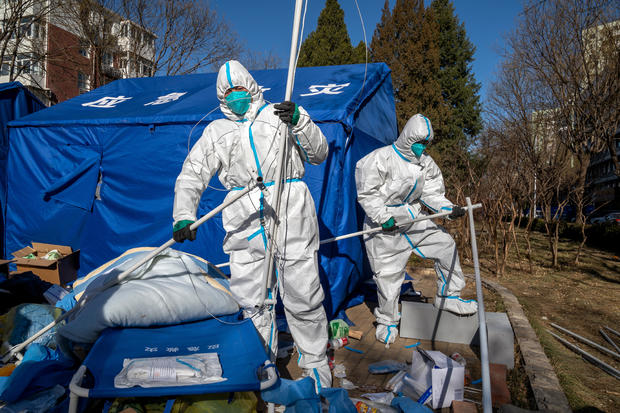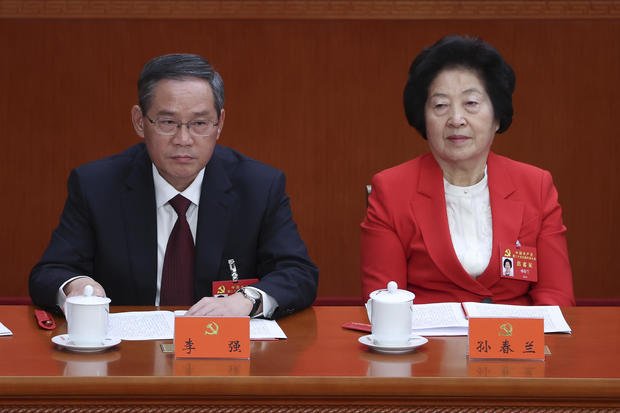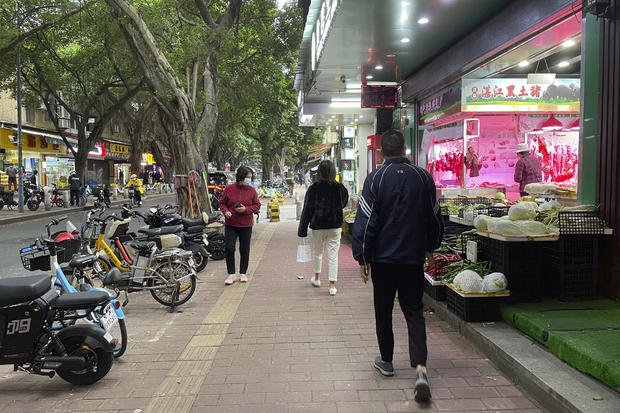China signals possible shift from "zero-COVID" policy after unprecedented protests
Beijing — Three years after the first COVID-19 patient was documented in central China, officials in Beijing appear, finally, to be coming to terms with some realities that most other countries eagerly seized upon months ago to start moving their battered economies and societies past the darkest days of the pandemic. By Thursday, there had been a notable shift in both the rhetoric from Chinese officials, and in policy in two major cities, indicating what could be the start of a shift away from the contentious "zero-COVID" policy.
That policy, championed by President Xi Jinping, has since the beginning of the coronavirus pandemic made it the absolute mission to stamp out every single case of COVID-19 by quickly throwing all known cases into quarantine and isolating anyone who may have come into contact with the virus. That's meant entire cities shut down for weeks, even months at a time, and residents literally barricaded into apartment complexes, along with a seemingly endless regime of mandatory testing.
The lynchpin to the entire policy has been an unwavering line from all officials in Beijing and their subordinates in China's provinces that COVID-19, in all of its forms, was a health risk too great for society to bear, so it must be battled at all costs. And those costs have been tremendous, fueling mounting frustration within the Chinese population that prompted nearly unprecedented protests against the zero-COVID policy last weekend — and against Xi himself.
As CBS News correspondent Holly Williams reported Thursday, the protests were the first time in more than three decades that China's rulers have faced explicit calls for the downfall of the Communist Party. While the party didn't appear to be seriously shaken, there were subtle signs that the message was delivered.
Now there appears to be a tiny crack in the ruling Chinese Communist Party's suit of anti-COVID armor: A top official has acknowledged for the first time something that many global health experts and national health officials have accepted for months: That the currently-pervasive Omicron strain of the virus, while highly contagious, seems less lethal than its predecessors.
"The pathogenicity of the Omicron virus weakens," Sun Chunlan, the vice premier of China's cabinet, who has supervised the country's anti-COVID measures and often travels to outbreak hotspots, said Wednesday. State-run media said Sun had told a meeting of the National Health Commission that the country now faces "a new situation" with "new tasks."
Her remarks quickly ricocheted across China's social media universe. The hashtag "Omicron pathogenicity weakened significantly" briefly soared to the top of trends Thursday on the Twitter-like Weibo platform.
One user wondered, "Is the wind changing direction? After all, we are exhausted."
Even on the tightly controlled pages of China's state-run media — which have for three years dutifully touted the dangers of COVID and highlighted the much higher death tolls in countries that never imposed measures anything like the zero-COVID policy — articles have now appeared suggesting "we should not panic too much over Omicron."
The shift may seem nuanced, but in a country where absolute control over every single narrative is so important to the government, it could be significant. And the official language isn't all that has softened in the wake of the protests.
On Wednesday, two of China's megacities, Guangzhou in the south and Chongqing in the west, both announced an easing of the draconian anti-COVID restrictions.
Chongqing, home to more than 30 million people, will now allow some close contacts of positive COVID cases to quarantine at home rather than in centralized, government-run isolation centers. Those centers became focal points of outrage after the deaths of several people, including children, were blamed on the conditions inside them.
Lockdowns were lifted in some parts of Guangzhou, meanwhile, as a health official in the city of more than 15 million people said the government should seek to minimize the "inconvenience caused to the public" by anti-virus measures.
Nationwide, 36,061 new COVID-19 infections were reported on Thursday, continuing a downward trend that coincidentally started after the protests across the country last weekend.
That overall caseload is still near record levels, however, and capital city Beijing recorded a new daily record of 5,006 cases on Thursday. That suggests that if there is a real shift beginning away from the iron-sided zero-COVID policy, it may be due more to a recognition of the threat from a frustrated Chinese population than any change in the spread of the virus.






